Summer Study: What Do Phase I Scholars Do?
DO‑IT Phase I Scholars participate in a two-week, live-in Summer Study session on the UW Seattle campus. They learn about college life; explore the Internet; interact with peers, staff, and mentors; and have fun. The DO‑IT Scholars program started in 1993 as an experimental project for teens with disabilities nationwide. It is currently open to Washington State teens and is supported by the State of Washington, the Boeing Company, the Microsoft Corporation, and the National Oceanic and Atmospheric Administration.
Eyes Wide Open
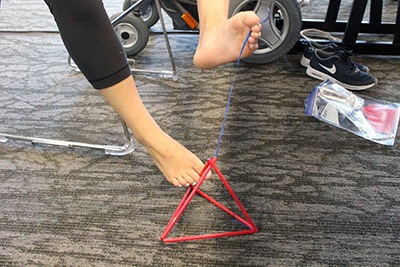
We see the world through our own narrow lens, and we each only have one life to live. We each have our own perspective on this life, and sometimes it can take having an open mind, taking on new experiences and opening our eyes to go beyond our own point of view.
Kylee-Lynn: Before DO-IT, I perceived independence to mean driving a car or living in an apartment. I have come to learn that independence actually requires many more individual steps. Before DO-IT, I never thought about it like that. I was afraid to look at life differently, but DO-IT gave me a safe place to do things I had never done before, such as test driving a scooter and putting myself in others’ shoes. These experiences have lessened the fear of going to college and changed my perspective.
Teresa: Prior to my arrival at DO-IT I saw myself as a charismatic and humble person who was easy-going, easily understood, and able to easily understand others. I thought I knew what it was like to be different. Being a DO-IT Scholar is not the easiest thing. In fact, it has significantly pushed me mentally. I had never been so included in such a diverse group. Ten days with this group of people, opened my eyes to how many different battles people are constantly fighting. DO-IT forced me to be okay with advocating for myself and for others. It forced me to be a leader and amplifies the importance of independence. I realized that all these individuals who have different abilities can do almost anything they set their mind to. DO-IT really boosted my self-esteem and reminded me that being different is okay by opening my eyes to the diversity of the world. My physical disability is only minor, and the real transformation is perspective.
Teresa and Kylee-Lynn: The biggest takeaway from attending DO-IT is the valuable perspective it created for us. We both came in afraid of judgment and hard-to-reach expectations. We both quickly realized just how irrational our fears were. The influence other Scholars had on us was a huge blessing. We both found people that had a lasting effect on our hearts. The struggles that we came in with were quickly disregarded because of the support from staff, interns, and peers. Having this experience allows us to embark into our future with our eyes wide open.
Independence Through Assistive Technology
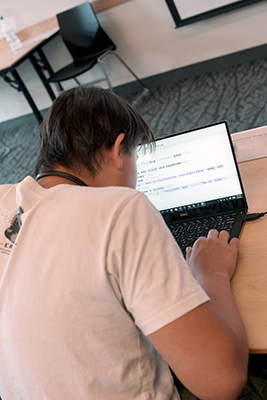
Imagine being less independent than you want to be because of a disability. People with disabilities, however, can use tools and assistive technology to make college, careers, and everyday life more accessible.
Enter Microsoft, a technology company who tries to help the larger population. Every year Microsoft runs a weeklong coding marathon, or “hack-a-thon,” geared towards people who do not usually get the chance to work together every day.
Over the past few years, Microsoft has made dramatic strides to help people with disabilities function more independently. There are many examples of assistive technology from Microsoft. One of which is Seeing AI. This program is meant to help the blind by allowing them to comprehend what is around them. When they walk past a monument or important landmark, an earpiece speaks to the blind individual about the landmark.
A person with ALS (amyotrophic lateral sclerosis) is able to regain independence, thanks to a wheelchair that is equipped with a computer controlled by one’s eyes. For example, if one looks left, then the chair will move left, without the use of a joystick, thus increasing independence of someone who may be unable to use a joystick.
Another assistive technology item is a program called OneNote, which has built in accessibility features. One main feature of this program is that it will read text to you and break large words into separate syllables. This helps people with dyslexia, because the smaller the parts, the easier it is for a text to be understood, therefore helping to increase reading speed and become more efficient. When given access to the right technology, people with disabilities become more self-sufficient.
Exploring a Makerspace
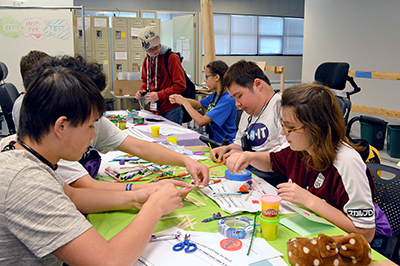
During the first Wednesday of Summer Study, the Phase I DO-IT Scholars went to the CoMotion Makerspace. Assistant professor Kat Steele introduced us to the workspace, which included 3-D printers, sewing machines, and laser cutters. We saw many students working with this equipment as well as other students designing objects with computers.
We went through the design process to learn how to build a wallet. The wallets were just prototypes, because we only had craft supplies, like pipe cleaners, duct tape, and colored paper to build the wallet. However, after building the wallet, we found its flaws and made it better, then we presented it to the group.
The Importance of Self-Advocacy
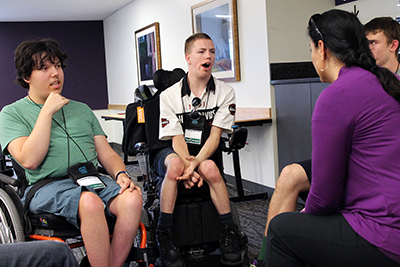
Z: Maya Angelou once said, “I learned a long time ago the wisest thing I can do is be on my own side, be an advocate for myself and others like me.” Self-advocacy is such an important skill to have, especially in college. During my high school freshman year, I wasn’t as prepared as I had thought. I had difficulties speaking up for myself, because I felt personally embarrassed being dependent on other people. It was difficult to ask people for what I needed. Being at the DO-IT program changed my mindset. I felt more comfortable advocating for myself because I was not alone. It became clear that I needed to stop depending on my one-on-one aid at school and instead advocate for me. I now know that I have rights that I shouldn’t be ashamed about. It has taken me a lot of time and practice to become a skilled advocate for myself.
Jon: Self-advocacy is used in everyday life, no matter if the person is disabled or not. Self-advocacy allows people to be more independent with their lives. During my time with DO-IT, I’ve seen more people with disabilities do almost anything. I even use self-advocacy in my life. Self-advocacy leads to independence.
Benefits of Diversity
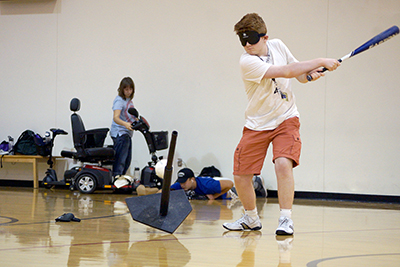
The DO-IT program has a very diverse group of people with a variety of disabilities. DO‑IT teaches a lot about accessibility and offers solutions.
We learned what it was like to have different disabilities. Through the Accessible Sports Expo, we experienced playing beeping baseball. While wearing a blindfold we hit a ball off a tee. In real beeping baseball, blind players pitch the ball and hit it, using only the sound of the ball. It was challenging relying on our ears. We also played other accessible sports, like wheelchair basketball and seated volleyball.
Even though our group is very diverse, many of us realized we face similar challenges. Some of us have found solutions to these challenges that others have not, so we learned from each other. Seeing examples of others’ solutions and learning about more assistive technology allowed us to realize we could overcome our problems.
Before the DO-IT program, we always thought “I’m a minority, so people shouldn’t have to bother helping me.” DO-IT showed us we should do all we can to make sure life is accessible so we can be successful. It was encouraging to meet other people with disabilities who share similar passions. Everyone is unique in their own way. Many people with disabilities would say their disability made them who they are and wouldn’t change it. DO-IT has made us aware of this perspective.
Why We Need Accessible Sports
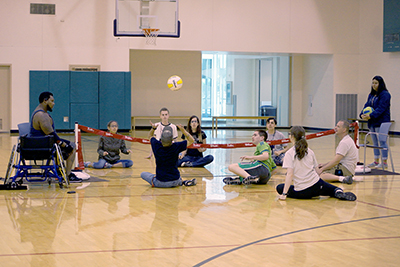
Accessible sports should be available in every school because they support unity and inclusivity for all members of the community. Accessible sports encourage people to be independent, rely on themselves and acknowledge what they bring to the table. They challenge people to improve both physically and mentally to persevere and overcome challenges. It is important for people to be able to adapt to be successful in life.
There are many kinds of sports for people with disabilities, such as wheelchair basketball, seated volleyball, and beeping baseball (a form of baseball for the blind). Accessible sports can be for anyone, such as people who are injured but still want to stay fit. When I played basketball, I understood the importance of accessible sports and had lots of fun! This just shows that no matter what disability you have, you can still play sports.
Visiting Microsoft
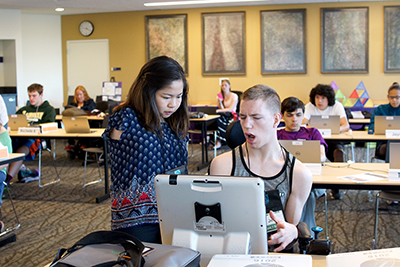
As we walked into the Microsoft building, we couldn’t help but feel a little awestruck. The buildings were big, shiny, and full of perks like a fridge full of sodas. “What an amazing place!” we thought.
We were greeted by two very enthusiastic Microsoft employees, both part of Microsoft’s accessibility department. The activity they had us do was to design a product to help people with a specific disability. Each group designed one for a different disability. The greatest creation was a unicorn-centaur product for people who lack a lower half.
We also had an amazing panel full of people who are associated with Microsoft’s disability department, which we all found very motivational. We then had a showcase of the three new innovations created to help people with disabilities. First, the Eye Gaze wheelchair, an app that helps mostly paralyzed people use their power wheelchairs. Second, a OneNote add-on that helps people read more easily. Lastly, an app that takes pictures and then tells someone what it is. Not only were the products amazing, they showed how people can help others. Many of the people behind these products did not have a disability but still they created these innovative, if not possibly essential, products. We truly were inspired. Microsoft was an amazing experience that we would preach to the entire world if we had soapboxes.
Food Critique
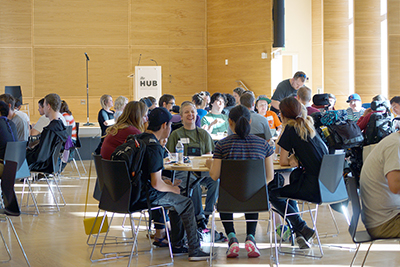
The food at Lander Hall (Local Point) may be mediocre, but it is still better than most of the food items found in your high school cafeteria. This report of the food at Lander Hall’s cafeteria covers three topics: the taste of food, dietary freedom, and the services offered.
The taste of the food at Local Point is average. It is better than most of the food at high schools and several other restaurants. Although there are different options, the taste of the food is usually the same, which is good. I wish that there were more options for breakfast, lunch, and dinner. I also wish there was more seasoning in the food. Overall, the food is good, but needs more flavor.
The dietary freedom offered at Local Point was sometimes a challenge. There are no labels on any of the items. It is crucial for people with dietary restrictions to have a clean environment where their food is prepared and labeled. The staff was quite friendly, but didn’t know a lot about allergies. This is a huge problem as one mistake could end with disastrous consequences. The staff should be well versed in all allergies to answer any questions people may have about the food that is served. Just like there is a selection of foods for vegetarians, there should be more options for people with dietary restrictions.
Lander Hall might not have the best food or dietary options, but their service was good. Whenever I walked into Lander Hall and paid for my meal, the person working the station always slid my card with a smile and asked me how I was. Also, the workers are quick to refill anything that is out and are happy to help when asked.
Overall the food and the dietary options were not the best, but what do you expect? This is all you can eat for under twenty dollars in a college dining hall. Maybe we are judging Local Point too hard, but they are just our honest opinions.